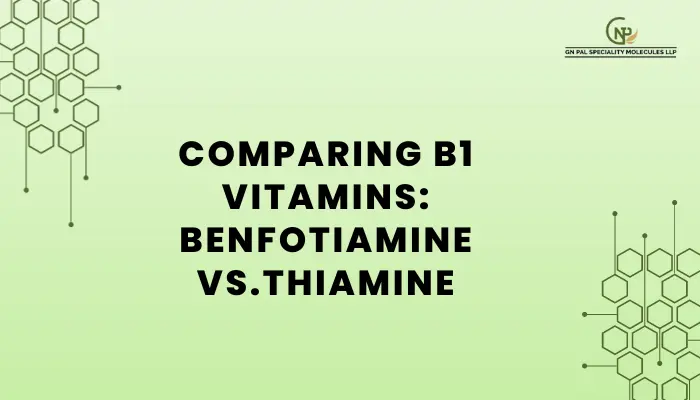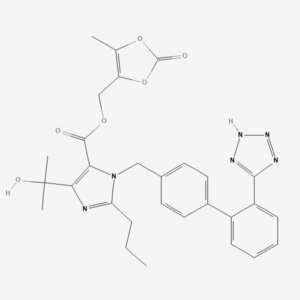Vitamin B1, also known as thiamine, is a crucial nutrient that plays an essential role in maintaining overall health, particularly in energy metabolism and neurological function. However, in recent years, a derivative of thiamine known as benfotiamine has gained attention for its unique properties and potential health benefits. This blog will delve into an in-depth comparison between benfotiamine and thiamine, exploring their differences, benefits, and how they can be incorporated into your health regimen.
UNDERSTANDING THIAMINE
Thiamine is one of the eight B vitamins that help the body convert food into energy. It’s particularly vital for the proper functioning of the heart, muscles, and nervous system. Thiamine is found in a variety of foods, including whole grains, legumes, and some meats and fish. Despite its availability in many diets, deficiencies can occur, leading to conditions like beriberi and Wernicke-Korsakoff syndrome, particularly in people with high alcohol consumption or malabsorption issues.
INTRODUCING BENFOTIAMINE
Benfotiamine is a synthetic derivative of thiamine, developed initially in Japan in the late 1950s. It’s a fat-soluble compound, which significantly influences its absorption and efficacy. Unlike thiamine, which is water-soluble, benfotiamine can be more readily absorbed by the digestive system and, therefore, may increase thiamine levels in the blood and tissues more effectively.
THE KEY DIFFERENCES
1. BIOAVAILABILITY:
The most notable difference between benfotiamine and thiamine is their bioavailability. Benfotiamine’s fat-soluble nature allows it to pass through cell membranes more efficiently than thiamine. This means that it can raise thiamine levels in the blood and tissues more effectively, potentially offering more substantial health benefits.
2. METABOLIC PATHWAY:
Once absorbed, benfotiamine is converted into an active form of thiamine called thiamine pyrophosphate (TPP) in the body. TPP is essential for energy metabolism, particularly in the brain and nervous system. Benfotiamine’s efficient conversion to TPP is one reason it’s considered potentially more effective than standard thiamine supplements.
3. THERAPEUTIC USES:
Both benfotiamine and thiamine are used to prevent and treat thiamine deficiency. However, benfotiamine has been particularly noted for its use in the treatment of diabetic neuropathy, a condition where high blood sugar leads to nerve damage, especially in the legs and feet. Studies suggest that benfotiamine can help reduce symptoms and improve nerve function in people with this condition.
BENEFITS OF THIAMINE
Thiamine is essential for all, given its critical role in energy metabolism and neurological function. It’s particularly important for those at risk of deficiency, including older adults, individuals with certain medical conditions, alcohol dependence, or those with a diet lacking in thiamine-rich foods. Supplementation with thiamine can help prevent complications associated with deficiency and support overall health.
BENEFITS OF BENFOTIAMINE
While benfotiamine provides all the benefits of thiamine due to its conversion in the body, its higher bioavailability and efficient conversion to the active form of TPP make it particularly beneficial for certain conditions. Its use in diabetic neuropathy is the most notable, with research suggesting it can significantly improve nerve function and reduce pain and discomfort associated with the condition. Some studies also suggest potential benefits in reducing complications related to Alzheimer’s disease and other forms of dementia.
INCORPORATING THIAMINE AND BENFOTIAMINE INTO YOUR DIET
For most people, a balanced diet provides sufficient thiamine. Foods rich in thiamine include whole grains, legumes, nuts, pork, and fish. However, for those who may be at risk of deficiency or have increased needs, thiamine supplements can help ensure adequate intake.
Benfotiamine supplements, on the other hand, can be particularly beneficial for individuals with specific health conditions like diabetic neuropathy. They are also considered by some to be a more potent form of vitamin B1 supplementation due to their superior absorption.
PRECAUTIONS AND CONSIDERATIONS
While thiamine and benfotiamine supplements are generally considered safe, it’s essential to talk to a healthcare provider before starting any new supplement, especially if you have existing health conditions or are taking other medications. They can help determine the right dosage and ensure that the supplements won’t interact with other treatments.
CONCLUSION
Thiamine is a vital nutrient essential for health, and benfotiamine offers an alternative form with potentially greater bioavailability and therapeutic benefits, especially for conditions like diabetic neuropathy. Understanding the differences between these two forms of vitamin B1 can help individuals and healthcare providers make informed decisions about supplementation and treatment options. Whether through diet or supplements, ensuring adequate thiamine intake is crucial for maintaining energy levels, neurological function, and overall well-being.




